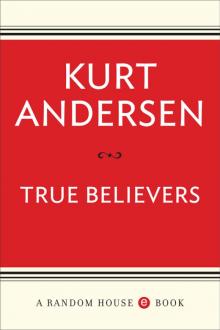- Home
- Kurt Andersen
Turn of the Century
Turn of the Century Read online
TURN OF THE CENTURY
KURT ANDERSEN
“An artfully plotted and often very funny novel … Turn of the Century is a convincing portrayal of the rhythms and stresses of a high-powered two-career marriage.”
—Newsday
“Andersen jacks you into the nerve center of the media society and pins your eyelids open until you go nearly blind with overload. He wins back terrain for the novel that has been ceded to new media, demonstrating that the novel is as alive and as nimble as its high-tech competitors. He’s got a book chock-full of references to today that stick out like neon Post-It tags … yet he’s infused it with so much inventive imagination that it transcends all that.… He’s managed to write a book portraying our fragmented lives that is not itself fragmented. In other words, he’s shown that the novel is flexible enough to encompass the chattering of its electronic cousins and, in the end, to hush them.”
—The New York Times Book Review
“A big, Tom Wolfe-ish New York comic novel … an ironic take on the last breath of the century.”
—Elle
“Packed with everything that’s made the decade what it is today—it’s an astonishing doorstop of a debut that deconstructs the 1990’s by peering just over the border into the next decade. It’s a fresh and frequently very funny point of view … his tour of the near future says volumes about the present.… The first most promising novelist of the Third Millennium … Can’t wait to see what he does with the next decade.”
—Entertainment Weekly
“A blockbuster fiction debut … this brilliantly conceived, keenly incisive social satire draws fresh humor out of the overhyped territory of millennial madness. Andersen’s eye is fresh and his irony carries a potent sting. Andersen employs a biting topical humor that is always exaggerated, yet seldom actually seems inconceivable. While the tone is hyperbolic and beyond the cutting edge, the core issues are curiously old-fashioned: love, ethics, friendship, even happiness. Andersen brilliantly sustains the comic pace throughout the lengthy narrative.”
—Publishers Weekly (starred review)
“Deftly written … Andersen has delivered a thorough and understated satire of America in the very near future.”
—GQ
“Impressive: a well-imagined picture of an info-teeming, overmediated, very possible near future … [a] hyper-sharp satire of business, media and manners … a sweet, mature love story. Andersen has clearly taken good notes while working in and commenting on the culture industry … his satire is militantly up-to-the-minute.”
—salonmagazine.com
“It comes alive like a caffeine jolt. Mr. Andersen is indeed way cleverer than your average bear, and when it comes to the details of how news and entertainment are cooked up and what it’s like to work with ‘the big owner-operators of American culture,’ he’s about as knowledgeable as you can get.”
—New York Observer
“Astonishing … the most unclichéd novel imaginable … Mr. Andersen is endlessly energetic and seems to know just about everything. Fortunately, most of the digressions are informative, wickedly satirical or outrageously funny and often all at once.”
—The New York Times
“Intriguing, entertaining, and persuasive … Andersen’s choice of topic and his style bring inevitable comparisons to Tom Wolfe.”
—St. Louis Post-Dispatch
“It’s a funny book! In his sardonic first novel, Kurt Andersen serves up a wicked Manhattan.”
—Mirabella
“Andersen certainly has caught the drumbeat of our times, he catches us as we truly are in our attempt to make the best of the society we have wrought.”
—Booklist
“The high point of the book is the amazing and amusing catalog of references to modern culture. Andersen inserts real people, places, and events into a barrage of images that includes Bill Gates, L.A., the NASDAQ, interspecies organ transplants, and the Beanie Baby craze.”
—Library Journal
A Delta Book
Published by
Dell Publishing
a division of
Random House, Inc.
1540 Broadway
New York, New York 10036
This novel is a work of fiction. Names, characters, places, and incidents either are the product of the author’s imagination or are used fictitiously. Any resemblance to actual persons, living or dead, events, or locales is entirely coincidental.
Copyright © 1999 by Kurt Andersen
All rights reserved. No part of this book may be reproduced or transmitted in any form or by any means, electronic or mechanical, including photocopying, recording, or by any information storage and retrieval system, without the written permission of the Publisher, except where permitted by law. For information address: Random House, New York, New York
Delta® is a registered trademark of Random House, Inc., and the colophon is a trademark of Random House, Inc.
eISBN: 978-0-307-78557-2
v3.1
FOR ANNE KREAMER
This is a work of fiction—which should go without saying, given that the story is set in the future. Any similarity between an imaginary character and a living person is coincidental. Although dozens of well-known real people are mentioned in the book, and a few speak, the actions and dialogue attributed to them are fictional. Imaginary products and companies are also intermingled freely with real ones, but where real companies are mentioned, many of the events and products and characters connected with them are imaginary, and none of these fictional creations should be construed as depictions of real events, people, or things. For instance, there is no place like BarbieWorld operating under Mattel’s auspices. The portrayal of Microsoft’s business practices and executives is fictional. And while the description of computers’ vulnerability to hackers is accurate, the author has no detailed knowledge of any particular company’s systems or security procedures.
Contents
Cover
Title Page
Copyright
Dedication
Part One Chapter 1
Chapter 2
Chapter 3
Chapter 4
Chapter 5
Chapter 6
Chapter 7
Chapter 8
Chapter 9
Chapter 10
Chapter 11
Chapter 12
Chapter 13
Chapter 14
Chapter 15
Part Two Chapter 16
Chapter 17
Chapter 18
Chapter 19
Chapter 20
Chapter 21
Chapter 22
Chapter 23
Chapter 24
Chapter 25
Chapter 26
Chapter 27
Chapter 28
Chapter 29
Chapter 30
Chapter 31
Part Three Chapter 32
Chapter 33
Chapter 34
Chapter 35
Chapter 36
Chapter 37
Chapter 38
Chapter 39
Chapter 40
Chapter 41
Chapter 42
Chapter 43
Chapter 44
Chapter 45
Chapter 46
Chapter 47
Part Four Chapter 48
Chapter 49
Chapter 50
Chapter 51
About the Author
Acknowledgments
PART ONE
February
March
1
He has just left an early breakfast meeting—very early—with three men he’s never met before. He’s never heard of the men, in fact, and
he planned to blow off breakfast until his partner told him he should go, because the men are important and potentially useful. He trusts his partner, who used to work for their agency. They are agents, all three of the men at breakfast, but agents who made it very clear that they prefer never to be called agents. He is already confusing and forgetting their names, even though the men’s main purpose in coming to town, they strongly suggested, was to meet him and tell him they would love to be in business with him. That’s the phrase these people always use: “We would love to be in business with you,” said in a breathy, solemn, confidential way that makes it sound profound and salacious. He is walking up the Avenue of the Americas, just south of Forty-seventh Street, now thinking of almost nothing but the morning sunlight pouring over from the right, making the line of proud, gray, dumb, boxy giants on the left—Smith Barney, Time-Life, McGraw-Hill, News Corporation—prettier than they deserve to be.
A pair of mounted police walking past him, about to make the turn onto Forty-seventh Street, snags his attention for an instant, the very instant a signal reaches the tiny device wedged in his left inside jacket pocket. It is forty-two minutes and forty seconds past eight on the twenty-eighth of February.
Between his right thumb and forefinger he grips a huge paper coffee cup, and, with the other three fingers, the handle of his briefcase. As the device’s programmed sequence proceeds, there is no noise, not even a click, only a tiny, continuous, hysterical vibration. In the first quarter second, the muscles in his chest tense and his left nipple goes erect. He takes a short, sharp, surprised breath and, without thinking, flings the coffee toward the gutter, then grabs at his left pocket with his right hand. But already the first instant of dumb panic has congealed to dread—two seconds—as he claws to find the device, to punch the button, to shut the thing down before the sound—three seconds … four seconds—before it is too late.
It is too late.
“Hey, man,” says the young man kneeling and looking up at George Mactier. His eyebrows, George sees, are sculpted into what look like Morse code dots and dashes, each eyebrow a different letter. “What the fuck you, man, you fucking clumsy dick, man! Shit.”
The messenger’s electronic signature-slate clipboard and his Day-Glo green nylon satchel of envelopes are drenched now in steaming ultra-venti latte, skim milk, extra shot of espresso. His helmet—a glossy magenta with built-in radio mouthpiece, like a fighter pilot’s—has been knocked off the handlebars and into the street by George’s briefcase. The helmet is now skittering up Sixth like a pinball between the tires of an accelerating Harlem-bound M5—one of the dozen new, clear, vodka-bottle-shaped Absolut Transit buses the city has been given for Christmas. The two men each survey the wreckage. If only the restaurant’s espresso machine hadn’t been broken, George knows, he wouldn’t have stopped at Starbucks; if the espresso machine at the Millennium hadn’t been broken and he hadn’t stopped at Starbucks, this poor groovy schmo wouldn’t despise him, and the chasm between the races and the classes and the generations wouldn’t now gape a nanometer wider. Perhaps it was the fluttering of a satyrid’s wings in Bhutan that had roiled into a breeze in the South China Sea that blew across the Pacific and became a thunderstorm last week in Oakland, and that delayed the shipment of an espresso-machine valve to the Millennium.
“Maybe the helmet, maybe you can—”
“Maybe I can what, man? My boss is gonna motherfucking criticize my ass so bad, man,” the messenger says, looking up at George. “You know that? He’s Soviet, man!”
“I’m really—oh, jeez, look at your pants, too. I’m sorry.” George leans in to help him up, but then remembers the kid hasn’t been knocked down. He was kneeling when George flung the coffee, fiddling with his bike, and so instead, George just quickly touches his sweaty green-and-pink-spandexed shoulder and says again, “Sorry.”
“The thing was brand-new, like three hundred dollars, I think. Man.” They stare together across the street at the bashed, cracked pink helmet still wobbling crazily. (Stenciled on its side in big teal letters is a phrase George reads as !MOM !69. A rap group? A brand of heroin? A lifestyle choice?)
“The coffee cup sort of like … collapsed.” Sort of.
The silent, five-second-long vibrating alert on the tiny device in George’s pocket has given way to the up-and-down do-re-mi-fa-mi-redo chromatic tweet of the audible alert. His wife, Lizzie, has said it sounds like reveille for pixies, and his stepdaughter, Sarah, has asked him if he cares if it makes strangers think he is gay. But George has stuck with the little tune rather than any standard beeeeeep choice, because it subverts the display of self-importance, he hopes, of getting a cell-phone call on the sidewalk, in an elevator, at a restaurant table. It has finally become possible, for about three years now, to carry on a phone conversation walking down the street and not look like an asshole. It’s still not possible in a restaurant, he and Lizzie agree. Yet is consistently looking like an asshole really any different from being an asshole? This they are less sure about.
“My phone,” George says to the messenger with a lame, bashful smile. He nods toward the silly electronic noise deedle-de-deeing from his chest and starts to move away. “Sorry.” Shrug, step. “Sorry.” Five paces later, crucially beyond the latte blast radius, freed again to be just another pedestrian, George puts his briefcase on the sidewalk and finally pulls out the phone.
“Hello?”
“George? Honey—”
“Yeah?” He hears nothing. “Lizzie?” Nothing. “Hello?” He punches END. He will wait for her to call back. Holding the phone a foot from his face, he leans against the sandstone of Rockefeller Center, the real Rockefeller Center, staring distractedly through the mists of his own winter breath at new Rockefeller Center, the stolid late-fifties and early-sixties addendum across the avenue. The sunlight has diffused now. But the buildings still look strangely, unaccountably handsome. Have they been steam-cleaned? Is it the new outdoor sculpture (Torqued Mousetrap with Logo, three blocks long, by Richard Serra) that Disney installed on the sidewalk? Or is it because Lizzie announced this morning as he said goodbye and she spat out toothpaste that she is desperate for him to fuck her? Where has his contempt gone? Then he realizes: the skyscrapers that looked atrocious in 1980 and 1990 now, in 2000, look quaint, elegant, swingy. He isn’t aware of having revised his opinion; his opinion has been changed for him, updated automatically, gradually, by sensibility osmosis, leeching from glossy magazines and newspaper style sections into George’s brain. First Frank Sinatra, cocktails, Palm Springs, rayon garments, plastic furniture, and all kinds of Cold War bibelots were resuscitated, even the words VIP and chick—and now, as of this morning, these buildings, which George has spent a few seconds every week of his adulthood loathing actively, are looking kind of cool. He doesn’t know whether to feel pathetic or liberated by the insight.
The phone jiggles.
“Yeeeesss?” he says joshingly.
“Oh, George.”
“What is it?”
“Your mother died last night.”
“Ohhhhh …” He feels like he’s been shot in the face at close range. With blanks, but it’s still loud and sickening. “Oh, Christ.”
“I’m so sorry, darling.”
“How? I mean …”
“Honey?”
“She told me a couple of weeks ago her doctor said she probably has years.”
“It wasn’t the cancer. She was in a car accident, honey. She was driving home on the interstate from her line-dancing class, and she slowed way down for some animal, a weasel, and a giant semi rammed into her.”
“Which car?”
“Which car? The Yugo.”
“Christ.”
“Your sister says she, you know, she didn’t—it all happened so fast, she died instantly.”
George watches the messenger he victimized pedal west toward Times Square. With the helmet now right side up, he sees that the odd legend, on the satchel as well as the helmet, isn’t !MOM !69, bu
t GO! NOW! It’s the name of a messenger service; the same company operates the car service Lizzie uses at work.
“So,” Lizzie says, “I’ll go home and pack.”
“You don’t have to. We can fly out in the morning.”
“Why not tonight?”
“We’re presenting the shows to Mose at six-thirty, which means I’m out of here at seven. At the earliest. This is the meeting, Lizzie. I guess we could try to reschedule, but Emily’s flying in from L.A. for it, and she needs to be in Washington at some Kennedy Center Al Gore thing tomorrow.” He knows he’s babbling. “But, I guess, if we could maybe get in to Mose tomorrow … No, shit, tomorrow is, he’s—Mose and the rest of them are going—are in, uh, Washington State? … Maybe Vancouver. Someplace out there, I’m not sure, for something.” He coughs; so lame. “I think I really ought to be here this afternoon.”
His mother was killed hours earlier; he and his partner are to have an audience with the chairman of the network to pitch two new shows; now he’s concealing a business secret probably not worth concealing from his wife, and doing it clumsily. He isn’t even sure what he’s dissembling about. He’s only heard snippets, glancing references, roundabout allusions, all equally plausible and implausible, all equally reliable and unreliable. Asian video-game programming? An agreement to earmark MBC’s extra digital channels for data transmission in return for putting the network’s two-A.M.-to-five-A.M. home-shopping show Booty! on Microsoft’s WebTV? Some grander plot to ally with Microsoft against Intel, or to make life a little unpleasant for NBC vis-à-vis MSNBC? Computers and the internet, so radiant with revolutionary promise and terror, change everyone’s business strategy every other month, so the gossip changes every week to keep up. All he knows definitely is that he shouldn’t be frank with Lizzie. The strands of anxiety are too much, each exacerbating the other and making George feel guilty and stupid.

 True Believers
True Believers Heyday: A Novel
Heyday: A Novel Turn of the Century
Turn of the Century